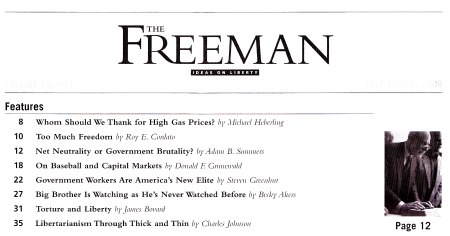Plains-spoken philosophy
(Via Roderick and my dad.)

Back when I was an undergraduate, I had the unexpected privilege of spending about two and a half years in one of the best Philosophy programs I could possibly have found–the Philosophy department at Auburn University. Those of you who know me probably know, and those of you who just know the blog may have guessed, that part of the reason for that was meeting and spending a lot of time studying with Roderick Long. Another important reason was the time that I spent studying and talking with Kelly Jolley, the current Chair of the department. It would be impossible to list all the philosophical, intellectual, and personal debts that I owe to Kelly, Roderick, and the rest of the faculty at Auburn (James Shelley, Mike Watkins, Eric Marcus, Jody Graham, …). So I’m really pleased to see the New York Times Magazine’s article about Auburn’s philosophy program, and Kelly in particular, which gives you a glimpse into a really quite remarkable story — the role that Kelly’s personality, teaching style, and indefatigable efforts played in transforming the Auburn philosophy department into the best department in the University, and a paradigm of liberal education at its very best — demanding, challenging, collegial, invigorating, and life-changing. And all this in the midst of a big state school that used to be dismissed as that cow college on the other side of the state.
It’s certainly a story that’s much deeper, more compelling, and ultimately much more useful than anything you’ll find in the firehose spray of little squibs and blurbs on lipstick or politicians’ summer homes or the sanctimoniously-executed power-plays and poll results for the Hopesters and Changelings of the world. Philosophers are constantly heckled — mainly by those who confuse busy-ness with importance and operational success with a life well lived — that philosophy, and the broader projects of the humanities and liberal education, are silly projects — useless really — because they don’t matter to what’s called real life.
But if the sort of kitsch and trash that our practical journalists spread all over the front pages of our practical newspapers is what matters to your life, and philosophy is not, then the question you need to ask yourself is why is that the sort of life that I lead? And it’s as good a reason as you could ask for to change your life and to change the things that matter to it. And what I love about the Auburn Philosophy department, and one of the (many) things that I’m personally indebted to Kelly Jolley for, is the fact that that department really provides a place — one of the best examples of such a place that’s left in this modern world — where students are challenged to do that, expected to do that, encouraged to do that, and given access to the tools and the space and the teachers that they need for it.

